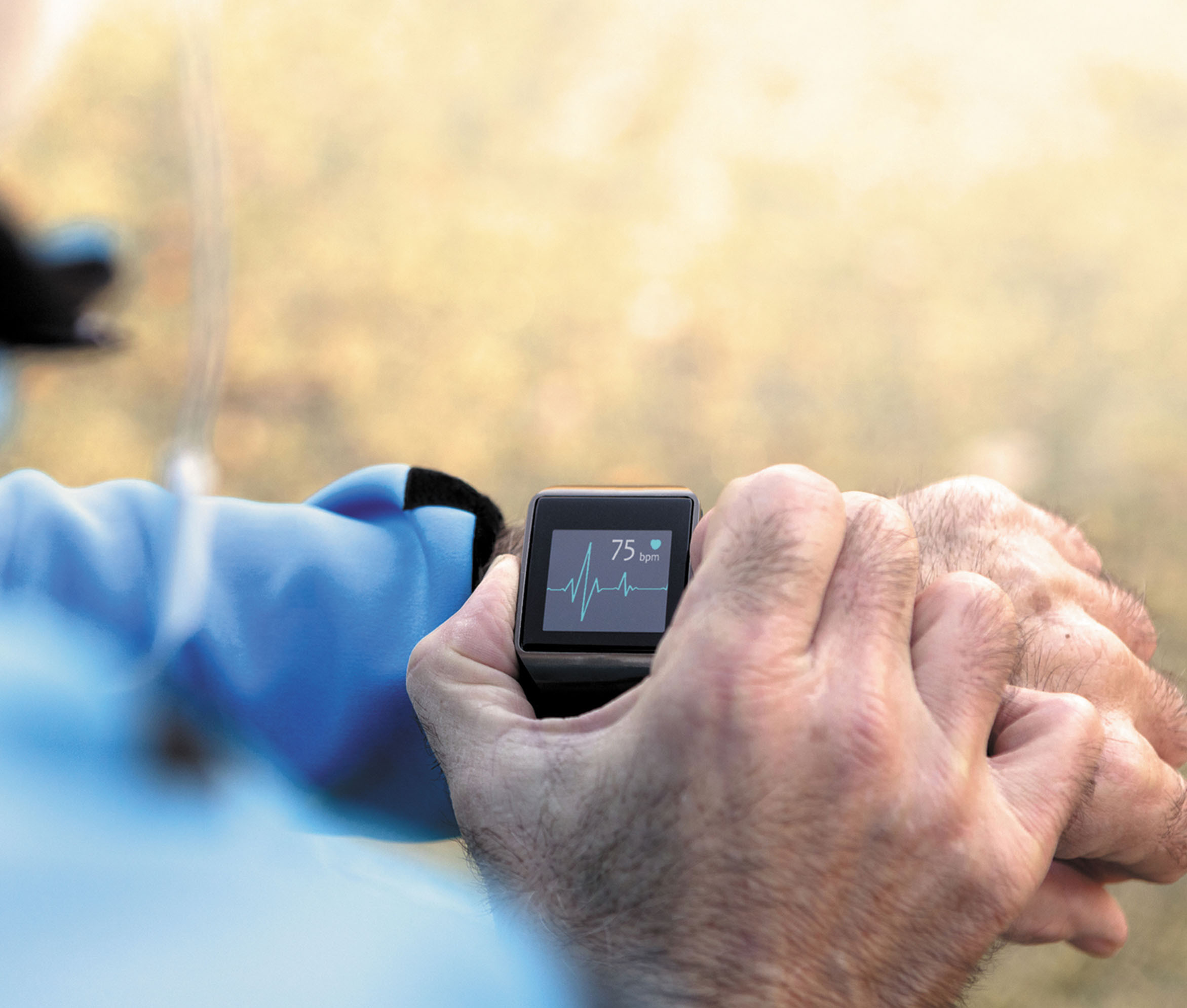What's the latest on wearables for finding atrial fibrillation?
Several smart watch brands can detect this common heart rhythm disorder. But whether this feature can improve your health remains unclear.
- Reviewed by Christopher P. Cannon, MD, Editor in Chief, Harvard Heart Letter; Editorial Advisory Board Member, Harvard Health Publishing

Five years ago, the FDA granted marketing clearance for the first smart watch capable of capturing the heart's electrical "signature," known as an electrocardiogram or ECG. An app enables the watch to detect atrial fibrillation (afib), the most common heart rhythm disorder (see "What is atrial fibrillation?"). Today, four additional smart watches with similar capabilities have FDA clearance, and more are expected on the market soon.
Because bouts of afib are often short-lived and sometimes symptomless, diagnosing it can be challenging. An annual ECG at your doctor's office, which lasts less than 10 seconds, may not pick up afib if it is occurring only occasionally. And unless you have symptoms, medical devices that check the heart for longer periods of time don't make sense.
But your smart watch can continuously monitor your pulse for an abnormally rapid or irregular heart rate and tell you to when record an ECG, which involves opening an app and touching the side of the watch for 30 seconds. In theory, this capability could pick up more cases of afib, which is important because afib raises the risk of stroke. Knowing you have the problem means you can take action. For people at higher risk, taking anti-clotting medications may help lower the risk of stroke.
The current evidence
But what do we actually know about how well these consumer devices work, and who might benefit from using one? If you already have one of these smart watches or are considering getting one, here's what you should know.
Currently, there are no randomized trials using smart watches to screen for afib that show a health benefit associated with their use. However, an analysis using simulated data based on average Americans suggests the strategy would be cost-effective in people ages 65 and older, says cardiologist Dr. Shaan Khurshid, a research fellow at Massachusetts General Hospital and one of the lead authors of the study, which was published in 2022 in JAMA Health Forum. "In older adults, consumer wearable devices have the potential to improve outcomes and lower costs by decreasing strokes," he says.
How reliable are the readings? According to a study published in February 2023 in JACC: Clinical Electrophysiology, about a quarter of the ECG readings from five smart devices were deemed "inconclusive." But setting those cases aside, the devices were all highly accurate in finding afib. The tested devices were the Apple Watch 6, the Samsung Galaxy Watch 3, the Withings ScanWatch, the Fitbit Sense, and the AliveCor KardiaMobile (a credit card–sized device you touch with your fingers and use with a smartphone).
The devices are not cheap; most ECG-enabled smart watches start at around $250. People should also be aware of the potential emotional cost of a false positive result (when the ECG incorrectly reports afib), which could cause anxiety. In addition, processing the sheer volume of patient data available is already a challenge for many doctors, and the need to review multiple smart watch ECG tracings could further strain our health care system. Finally, the people who would likely benefit most from afib screening may be the least able to afford or know how to use a consumer device, an issue that could further exacerbate existing health disparities in this country.
What is atrial fibrillation?Atrial fibrillation (afib) is a heart rhythm disorder that causes a rapid, irregular heartbeat. These bouts may occur for occasional, brief periods or much longer — even permanently in some people. About one in 11 people ages 65 and older has the condition, which is more common in those with high blood pressure, obesity, and sleep apnea. Possible symptoms include shortness of breath, fatigue, and dizziness. But sometimes, afib goes unnoticed. Recognized or not, this erratic heart rhythm can cause blood to pool in the heart's upper chambers. This increases the likelihood of clots, which can travel to the brain and block blood flow, causing a stroke. |
The bottom line
For people considering buying a smart watch, the ECG recording capability is a potential added benefit, says Dr. Khurshid. "But if you don't want to spend the money, there are many other ways to screen for afib," he adds. These strategies, which include simply checking your own pulse or wearing a heart monitor for a couple weeks, depend on your afib risk and symptoms.
If you already have afib, a smart watch may help you monitor the condition over the long term, which could help inform your doctor's treatment advice.
Image: © Nastasic/Getty Images
About the Author

Julie Corliss, Executive Editor, Harvard Heart Letter
About the Reviewer

Christopher P. Cannon, MD, Editor in Chief, Harvard Heart Letter; Editorial Advisory Board Member, Harvard Health Publishing
Disclaimer:
As a service to our readers, Harvard Health Publishing provides access to our library of archived content. Please note the date of last review or update on all articles.
No content on this site, regardless of date, should ever be used as a substitute for direct medical advice from your doctor or other qualified clinician.
















